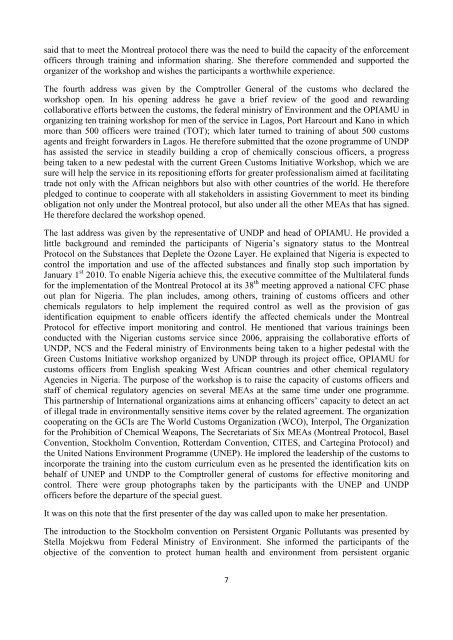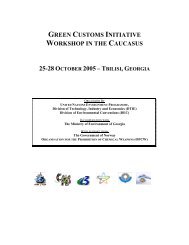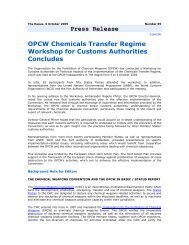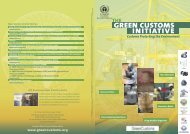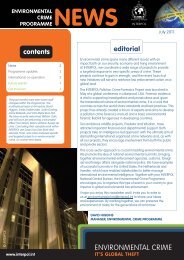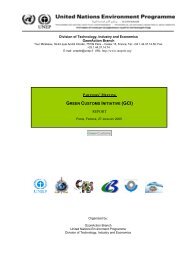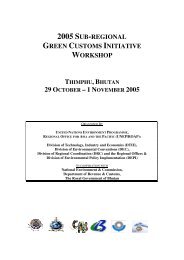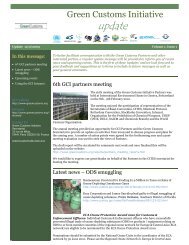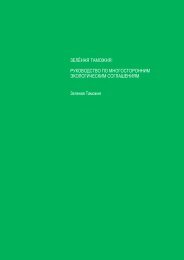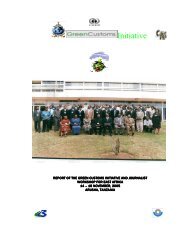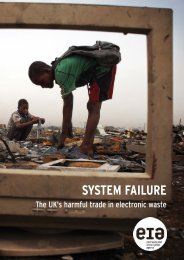workshop report. - Green Customs Initiative
workshop report. - Green Customs Initiative
workshop report. - Green Customs Initiative
You also want an ePaper? Increase the reach of your titles
YUMPU automatically turns print PDFs into web optimized ePapers that Google loves.
said that to meet the Montreal protocol there was the need to build the capacity of the enforcementofficers through training and information sharing. She therefore commended and supported theorganizer of the <strong>workshop</strong> and wishes the participants a worthwhile experience.The fourth address was given by the Comptroller General of the customs who declared the<strong>workshop</strong> open. In his opening address he gave a brief review of the good and rewardingcollaborative efforts between the customs, the federal ministry of Environment and the OPIAMU inorganizing ten training <strong>workshop</strong> for men of the service in Lagos, Port Harcourt and Kano in whichmore than 500 officers were trained (TOT); which later turned to training of about 500 customsagents and freight forwarders in Lagos. He therefore submitted that the ozone programme of UNDPhas assisted the service in steadily building a crop of chemically conscious officers, a progressbeing taken to a new pedestal with the current <strong>Green</strong> <strong>Customs</strong> <strong>Initiative</strong> Workshop, which we aresure will help the service in its repositioning efforts for greater professionalism aimed at facilitatingtrade not only with the African neighbors but also with other countries of the world. He thereforepledged to continue to cooperate with all stakeholders in assisting Government to meet its bindingobligation not only under the Montreal protocol, but also under all the other MEAs that has signed.He therefore declared the <strong>workshop</strong> opened.The last address was given by the representative of UNDP and head of OPIAMU. He provided alittle background and reminded the participants of Nigeria’s signatory status to the MontrealProtocol on the Substances that Deplete the Ozone Layer. He explained that Nigeria is expected tocontrol the importation and use of the affected substances and finally stop such importation byJanuary 1 st 2010. To enable Nigeria achieve this, the executive committee of the Multilateral fundsfor the implementation of the Montreal Protocol at its 38 th meeting approved a national CFC phaseout plan for Nigeria. The plan includes, among others, training of customs officers and otherchemicals regulators to help implement the required control as well as the provision of gasidentification equipment to enable officers identify the affected chemicals under the MontrealProtocol for effective import monitoring and control. He mentioned that various trainings beenconducted with the Nigerian customs service since 2006, appraising the collaborative efforts ofUNDP, NCS and the Federal ministry of Environments being taken to a higher pedestal with the<strong>Green</strong> <strong>Customs</strong> <strong>Initiative</strong> <strong>workshop</strong> organized by UNDP through its project office, OPIAMU forcustoms officers from English speaking West African countries and other chemical regulatoryAgencies in Nigeria. The purpose of the <strong>workshop</strong> is to raise the capacity of customs officers andstaff of chemical regulatory agencies on several MEAs at the same time under one programme.This partnership of International organizations aims at enhancing officers’ capacity to detect an actof illegal trade in environmentally sensitive items cover by the related agreement. The organizationcooperating on the GCIs are The World <strong>Customs</strong> Organization (WCO), Interpol, The Organizationfor the Prohibition of Chemical Weapons, The Secretariats of Six MEAs (Montreal Protocol, BaselConvention, Stockholm Convention, Rotterdam Convention, CITES, and Cartegina Protocol) andthe United Nations Environment Programme (UNEP). He implored the leadership of the customs toincorporate the training into the custom curriculum even as he presented the identification kits onbehalf of UNEP and UNDP to the Comptroller general of customs for effective monitoring andcontrol. There were group photographs taken by the participants with the UNEP and UNDPofficers before the departure of the special guest.It was on this note that the first presenter of the day was called upon to make her presentation.The introduction to the Stockholm convention on Persistent Organic Pollutants was presented byStella Mojekwu from Federal Ministry of Environment. She informed the participants of theobjective of the convention to protect human health and environment from persistent organic7


